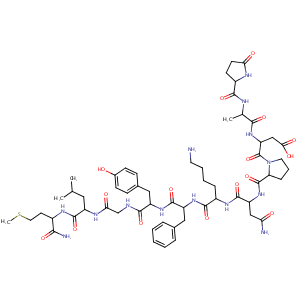Drug Information
| Drug General Information | Top | |||
|---|---|---|---|---|
| Drug ID |
D01VKI
|
|||
| Former ID |
DIB020718
|
|||
| Drug Name |
physalaemin
|
|||
| Synonyms |
Physalaemin; 2507-24-6; pGlu-Ala-Asp-Pro-Asn-Lys-Phe-Tyr-Gly-Leu-Met-NH2; AC1L29NZ; GTPL2094; LS-187659; LS-187047; L000921
Click to Show/Hide
|
|||
| Drug Type |
Small molecular drug
|
|||
| Indication | Discovery agent [ICD-11: N.A.] | Investigative | [1] | |
| Structure |
 |
Download2D MOL
|
||
| Formula |
C58H84N14O16S
|
|||
| Canonical SMILES |
CC(C)CC(C(=O)NC(CCSC)C(=O)N)NC(=O)CNC(=O)C(CC1=CC=C(C=C1)O)NC(=O)C(CC2=CC=CC=C2)NC(=O)C(CCCCN)NC(=O)C(CC(=O)N)NC(=O)C3CCCN3C(=O)C(CC(=O)O)NC(=O)C(C)NC(=O)C4CCC(=O)N4
|
|||
| InChI |
1S/C58H84N14O16S/c1-31(2)25-39(54(84)66-36(49(61)79)21-24-89-4)65-47(76)30-62-51(81)40(27-34-15-17-35(73)18-16-34)68-55(85)41(26-33-11-6-5-7-12-33)69-53(83)37(13-8-9-22-59)67-56(86)42(28-45(60)74)70-57(87)44-14-10-23-72(44)58(88)43(29-48(77)78)71-50(80)32(3)63-52(82)38-19-20-46(75)64-38/h5-7,11-12,15-18,31-32,36-44,73H,8-10,13-14,19-30,59H2,1-4H3,(H2,60,74)(H2,61,79)(H,62,81)(H,63,82)(H,64,75)(H,65,76)(H,66,84)(H,67,86)(H,68,85)(H,69,83)(H,70,87)(H,71,80)(H,77,78)
|
|||
| InChIKey |
SHSUJLMLURFKID-UHFFFAOYSA-N
|
|||
| PubChem Compound ID | ||||
| PubChem Substance ID | ||||
| Target and Pathway | Top | |||
|---|---|---|---|---|
| Target(s) | Substance-P receptor (TACR1) | Target Info | Agonist | [2] |
| KEGG Pathway | Calcium signaling pathway | |||
| Neuroactive ligand-receptor interaction | ||||
| Measles | ||||
| Panther Pathway | CCKR signaling map ST | |||
| Reactome | G alpha (q) signalling events | |||
| WikiPathways | SIDS Susceptibility Pathways | |||
| Gastrin-CREB signalling pathway via PKC and MAPK | ||||
| Spinal Cord Injury | ||||
| Peptide GPCRs | ||||
| GPCR ligand binding | ||||
| GPCR downstream signaling | ||||
| References | Top | |||
|---|---|---|---|---|
| REF 1 | URL: http://www.guidetopharmacology.org Nucleic Acids Res. 2015 Oct 12. pii: gkv1037. The IUPHAR/BPS Guide to PHARMACOLOGY in 2016: towards curated quantitative interactions between 1300 protein targets and 6000 ligands. (Ligand id: 2094). | |||
| REF 2 | The unpredicted high affinities of a large number of naturally occurring tachykinins for chimeric NK1/NK3 receptors suggest a role for an inhibitory domain in determining receptor specificity. J BiolChem. 1996 Aug 23;271(34):20250-7. | |||
If You Find Any Error in Data or Bug in Web Service, Please Kindly Report It to Dr. Zhou and Dr. Zhang.

